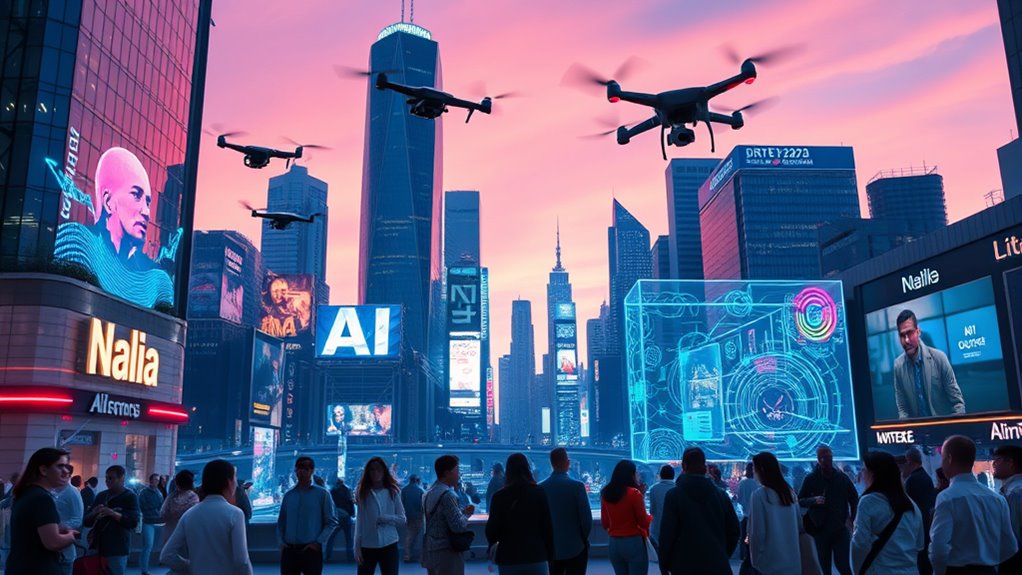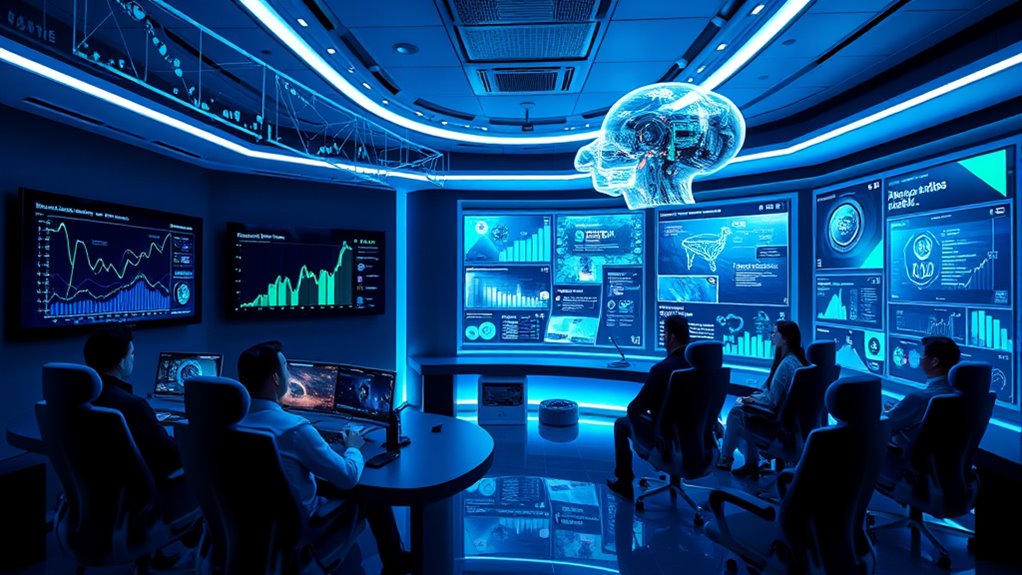By 2030, AI will transform marketing by enabling highly personalized experiences, smarter automation, and precise targeting that persuades consumers effectively. AI-powered content curation and generative tools like GPT-4 will create engaging, tailored messages at scale. Regions leading adoption will leverage these innovations for competitive edge. If you stay tuned, you’ll discover how AI’s rapid growth continues to reshape how you connect, influence, and convert your audience in ways you’ve never seen before.
Key Takeaways
- AI will dominate personalized content curation, enabling highly targeted and engaging marketing experiences by 2030.
- Generative AI like GPT-4 will automate creative and customer engagement tasks, transforming persuasion strategies.
- Faster processing speeds and smarter tools will enable real-time, data-driven marketing decisions at scale.
- Regional early adopters will leverage AI for competitive advantage through innovative, AI-powered marketing campaigns.
- AI-driven insights and automation will significantly enhance consumer trust and conversion rates in future marketing efforts.

By 2030, marketing will be fundamentally transformed by artificial intelligence, which is rapidly becoming the driving force behind personalized, data-driven strategies. You’ll notice that AI’s market size is exploding, valued at over $20 billion in 2024 and projected to hit more than $82 billion by 2030. This rapid growth, with a CAGR of 25%, reflects how deeply AI is embedded in marketing activities. The broader AI industry is also booming, expected to reach up to $1.8 trillion by the end of the decade, fueling innovation and investment. In the U.S., AI market value nears $74 billion, growing at around 27% annually, highlighting the country’s leadership in AI adoption. Enthusiastic funding flows into AI startups—$19 billion in 2024 alone—show how eager investors are to capitalize on this trend. As a result, businesses adopting AI boost productivity by 20-30%, which translates into massive economic gains, potentially adding over $15 trillion to global GDP. AI’s economic contribution is projected to be significant by 2030, further emphasizing its transformative impact. Regionally, North America dominates the AI marketing landscape, capturing roughly a third of the revenue share in 2024. Countries like China and the U.S. are expected to contribute substantially to global GDP through AI, with China projected to add 26%, and North America about 14.5%, by 2030. Quick adopters like Singapore, Denmark, and the U.S., with workforce openness and technological readiness, are poised to leverage AI’s full potential. Globally, AI impacts more than half of the businesses in advanced economies, with emerging markets catching up rapidly. High employee openness in North America and Asia-Pacific—36% and 46%, respectively—further accelerates AI’s integration into marketing strategies. Content curation remains the top application, driven by the need for personalized media experiences. Social media advertising and search engine marketing also benefit from AI, making targeting more precise and engagement more meaningful. Content curation, driven by the need for personalized media experiences, has become a cornerstone of AI-powered marketing strategies. Services, including consultancy and analytics, dominate the market with over 59% revenue share, underscoring reliance on AI-driven insights. Advances in machine learning, natural language processing, and generative AI like GPT-4 are powering automation, customer segmentation, and personalized content creation. As AI chip revenues soar past $80 billion by 2027, faster processing speeds and smarter marketing tools will become the norm, transforming how you engage, persuade, and convert consumers in the years ahead.
Frequently Asked Questions
How Will AI Personalize Customer Experiences in 2030?
In 2030, AI personalizes your customer experiences by dynamically adapting content, recommendations, and interactions based on real-time data and individual preferences. It predicts your needs before you even express them, creating seamless, context-aware interactions across all channels. You’ll notice consistent, tailored experiences whether online or in person, with AI continuously learning from your behavior to refine personalization and boost engagement, making every interaction feel uniquely yours.
What Ethical Concerns Arise With Ai-Driven Marketing?
You should be aware that AI-driven marketing raises ethical concerns like privacy violations, algorithmic bias, and manipulation. You might unknowingly collect data without clear consent or reinforce stereotypes through biased algorithms. There’s also a risk of exploiting consumer vulnerabilities with manipulative tactics. To stay ethical, prioritize transparency, obtain explicit user permissions, audit your AI for fairness, and give consumers control over their data and choices.
Will AI Replace Human Marketers Entirely?
AI won’t replace human marketers entirely; instead, it complements them. While AI handles data analysis, automation, and repetitive tasks faster, your creativity and strategic thinking remain irreplaceable. You’ll focus more on crafting compelling stories and building relationships, as AI takes over routine functions. This partnership boosts efficiency and innovation, allowing you to leverage technology without losing the human touch that truly connects with customers.
How Does AI Impact Data Privacy Regulations?
AI impacts data privacy regulations by increasing the need for compliance with diverse, evolving laws worldwide. You must guarantee your AI systems protect personal data, minimize data collection, and maintain transparency. Regulations like GDPR and the EU AI Act demand rigorous risk assessments, bias mitigation, and clear user disclosures. Staying adaptable and implementing robust privacy standards help you navigate the complex legal landscape and build trust with consumers.
What Skills Will Marketers Need in 2030?
By 2030, you’ll need a strong mix of technical, creative, strategic, and interpersonal skills. Master AI tools for automation, data analysis, and content creation. Develop hyper-personalized messaging and immersive campaign strategies. Stay ahead ethically, balancing automation with transparency. Enhance emotional intelligence and adaptability to leverage AI insights effectively. Collaborate across disciplines, continuously learn new technologies, and understand privacy issues to succeed in a rapidly evolving, AI-driven marketing landscape.
Conclusion
By 2030, AI will revolutionize your approach to persuasion, making it more personalized and effective. While some argue AI may diminish genuine human connection, research suggests it can enhance understanding when paired with authentic engagement. Embrace these innovations thoughtfully, blending technology with empathy. Ultimately, AI’s true power lies in amplifying your ability to connect—if you trust its insights without losing sight of the human element, you’ll stay ahead in the evolving marketing landscape.










